Embarrassment: A Form of Social Pain
By Christine Harris
This enigmatic emotion likely evolved to smooth social interactions, but it can have less desirable consequences in the modern world
This enigmatic emotion likely evolved to smooth social interactions, but it can have less desirable consequences in the modern world

DOI: 10.1511/2006.62.524
Embarrassment is ubiquitous in human social life, and it unfolds before us all the time. A woman stumbles as she enters a restaurant. Immediately, her face visibly reddens, and a goofy grin appears. Inwardly, she experiences an intensely unpleasant state of mind for what strikes her as an eternity. But soon she takes her seat, her facial color returns to normal, and life goes on.

Jacqueline Larma/AP Images
Commonplace though such occurrences may be, the inner and outer events that unfolded in the restaurant are a puzzling and distinctive aspect of human nature, and recent research discloses that the emotions involved frequently have consequences that are far from trivial. In medical settings, embarrassment may even be a matter of life and death.
What triggers the experience of embarrassment? In exploring the nature of emotion over the centuries, philosophers and psychologists have mostly come to agree that the triggers for particular emotions are usually not events that can be described in purely objective terms. Rather, what normally triggers an emotion is, in the jargon of emotion researchers, a cognitive appraisal. This refers to a belief that certain conditions hold in the world. One kind of mental state (an emotion) is triggered by another kind (a belief). Writing in the 1960s, the late psychologist Magda Arnold was one of the first to advocate this point, suggesting that emotions arise from an assessment (usually unconscious) of the significance of an event.
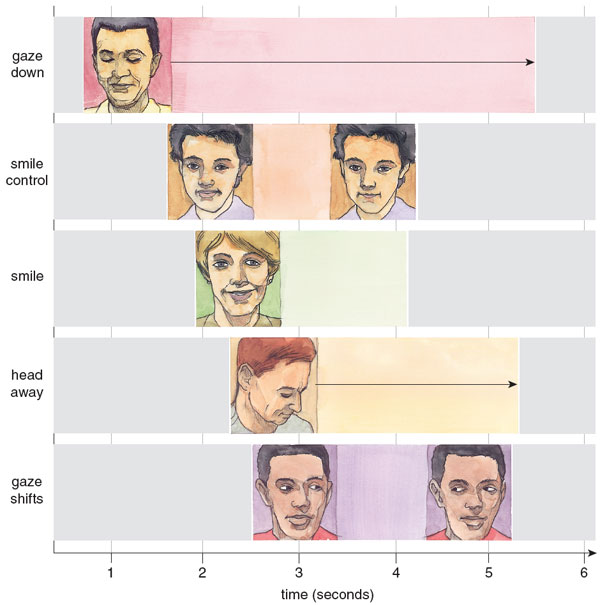
Illustration adapted from Keltner 1995 by Tom Dunne.
Why such a complex formulation? Must we pile mental events upon other mental events? To see why this has struck most theorists as unavoidable, it is useful to start with a simpler, and not necessarily social, emotion: fear. At first glance, one might assume that fear is simply how people respond to danger—fire, guns, lions and so forth. However, pause to consider a lion tamer who—while at work with a lion in a cage—just so happens to overhear a passing circus patron mention to another patron that he just read that the circus is going bankrupt. If the lion tamer experiences fear, what does the fear relate to? Not the lion, most likely, but rather the overheard conversation. Why? The conversation, not the lion, has triggered in the trainer's mind the recognition that his vital interests are in peril. Of course, it has had no such effect on the patrons—or the lion. One cannot make any finite list of the events that might cause a person to feel fear. The list would have no end, and it would depend on a complex web of beliefs and desires. What all the different states of the world that lead people to experience fear have in common is that they all trigger the perception that their well-being is threatened. No simpler or more "objective" theory will possibly work.
So, what appraisals trigger embarrassment? Over the years, several investigators have tried to answer this question. Two prominent accounts have emerged. The social evaluation model, championed by Rowland S. Miller at Sam Houston State University and others, seems closest to ordinary intuition. According to this account, what lies at the root of embarrassment is the anticipation of negative evaluation by others. In short, we become embarrassed when we perceive that the social image we want to project has been undermined and that others are forming negative impressions of us.
There is no doubt that many situations seem to fit this account quite well. It seems not to provide a complete story, however. For example, most people feel embarrassed when their friends sing "Happy Birthday to You" to them in a restaurant. Here, others' attentions are entirely positive and do not reflect negatively on the self in any way. So why feel embarrassed?
The late John Sabini of the University of Pennsylvania and his colleagues proposed that embarrassment is likely to arise when a person anticipates a disruption of smooth social interaction and faces a situation without a clear sense of the social expectations governing behavior. According to the awkward-interaction or dramaturgic account, it is not that the person is worried about making a bad impression per se, but rather that he or she does not know what to do next.
A variety of examples seem to fit this account. For example, Sabini notes, people invariably say that they would feel embarrassed to have to remind a friend of a debt that the friend had failed to repay. The negative evaluations would seem to apply only to the friend, not the self. Another example is receiving lavish compliments on your appearance. How do you respond? Do you give the person a compliment back? Tell her that you know you look great? According to the dramaturgic account, it is the uncertainty of not knowing how to proceed that gives rise to embarrassment in such cases.
Recent research suggests that a single theory probably is not adequate to account for all incidents of embarrassment and that there are at least two, and perhaps three, somewhat distinct subtypes of embarrassment. Sabini and colleagues had subjects rate how embarrassing they would find various situations. Factor analysis (a statistical technique for identifying how different variables are related) revealed three subtypes of embarrassing situations, which the authors referred to as faux-pas, center-of-attention and sticky-situation embarrassment. An example of one of their faux-pas scenarios was: five minutes after walking out of the bathroom at a museum, while you are with other people, a security guard calls out to you that your skirt is hitched up in the back. Being the guest of honor at a surprise party would be an example of a center-of-attention scenario. Sticky situations include cases such as the debt-repayment scenario described above.
Interestingly, people who reported the greatest amount of embarrassment over one type of situation were not necessarily the ones who reported the greatest embarrassment over the other two types of situations. Furthermore, different personality traits were correlated with different subtypes of embarrassment. For example, low self-esteem seems most highly correlated with embarrassment over a faux pas. "Extroverted" people did not seem to show any more or less of this type of embarrassment than others, but were less prone to embarrassment over sticky situations.
When does embarrassment first emerge? The common description of embarrassment as a self-conscious emotion gives us a hint. One necessary cognitive precursor appears to be having clear knowledge of oneself. As described by Michael Lewis in the January-February 1995 American Scientist, embarrassment does not seem to develop until a child has shown the ability to recognize that the figure in the mirror is her- or himself. This normally occurs between about 15 and 24 months of life, much later than the emergence of other emotions such as anger, fear and even jealousy. The first discernible cases of embarrassment in young children seem to fit more closely with the awkward-interaction model. For example, being intensely complimented will readily embarrass many toddlers. However, by three years of age, youngsters are doomed to feel embarrassment when they don't meet the expectations of others.
Naturally, most of us would prefer others not to form negative evaluations of us. We would also prefer all of our social interactions to proceed smoothly. We don't want to offend our bosses, look like oafs to our friends or be too open with our bodily functions in front of prospective mates. In modern life, it is easy to imagine why. We might lose our next promotion, be excluded by our friends or be rejected by a potential mate.
Although these examples are modern, it seems likely that our ancestors faced entirely analogous threats throughout our evolutionary history, with potential dangers even more stark than the risks modern humans often face. Group living presumably affords many potential benefits over living alone, yet it requires harmonizing different individuals' behaviors in a wide variety of ways. In the view of a number of theorists, embarrassment evolved to help undo the damage in situations where a person has unintentionally violated a social norm. The basic premise is that those who experienced and expressed distress over concerns with others' impressions of them were more likely to survive as reproductive members of the group than those who acted with disregard for others' opinions. Not caring about others' reactions might have led one to be ostracized or banished, perhaps even killed.
Embarrassment seems likely to serve three basic functions. First, it serves as an appeasement gesture to others by signaling that the violation was unintended and that it will not likely be repeated. Second, the intense dread of experiencing this emotion likely deters us from repeating whatever behaviors triggered the state. Thus, embarrassment is seen as a social counterpart to physical pain. Just as physical pain alerts us to threats to our physical well-being, embarrassment alerts us to threats to our social well-being (possible rebuke and rejection). Third, embarrassment motivates us to undo the social damage and restore the esteem of others. As we will see, several studies bolster these functional accounts.
Cognitive and Social Effects
Does displaying embarrassment really have a positive effect on others? To answer this, several studies have used a variety of clever methods for eliciting embarrassment. In an experiment reminiscent of a Fawlty Towers episode, Gun R. Semin, at Free University Amsterdam, and Anthony S. R. Manstead, at Cardiff University, created four versions of a video where a man accidentally knocks over a five-foot-high display of toilet paper in a grocery store. The man then displays embarrassment (or not) and fixes the mess (or not).

Illustration adapted from Keltner 1995 by Tom Dunne
Subjects watched the films and rated the man on various dimensions. The man who calmly rebuilt the display was judged the most "mature." However, the man was liked more when he showed embarrassment, regardless of whether he restacked the toilet paper rolls or simply walked away. Other research suggests that children who show embarrassment after an accidental mishap are likely to be less severely punished by mothers, and that people who blush after committing a faux pas are viewed as more trustworthy than those who do not.
Blushing doesn't always get someone off the hook though. One important precondition for blushing to serve as appeasement is that one must be seen as not having intended the act or as truly sorry for one's behavior. This was demonstrated in a 2002 study by Peter J. de Jong and colleagues at Maastricht University in the Netherlands. Pairs of female undergraduates played a repeated-trial prisoner's-dilemma game. The way the game works is that on each trial, a person has the option of cooperating or defecting. If both partners cooperate, they each get the same sum, say $5. If both defect, they only get $2. The most money can be had by defecting when your partner cooperates, resulting in $8 for yourself and nothing for her.
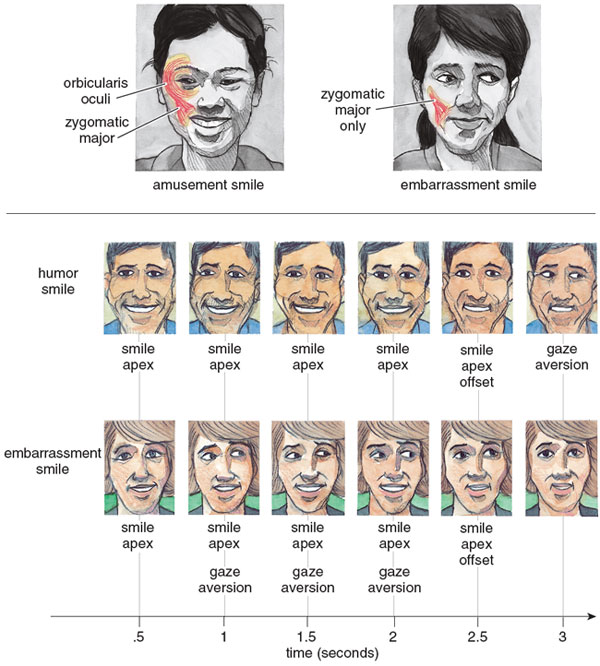
Tom Dunne
The game was made particularly interesting by recruiting subjects who endorsed highly prosocial and cooperative values, and telling them that they were being given an objective test of moral behavior. To ensure defection, the researchers instructed one subject to defect on a particular trial, unbeknownst to her partner. In complying, the defectors often blushed. Interestingly, those who blushed more intensely were judged less trustworthy. The authors suggest that the negative effect of blushing in this instance might be due to the partner taking it as a signal of a willful intentional violation of moral code.
Several features of the situation seem to influence the effect that displays of embarrassment have on others. These include the severity of the misbehavior, whether the act harms the observer or some third party, and whether such behavior is perceived as an unusual occurrence or indicative of a more lasting personal defect. This last suggestion has some support in early work by Jack Levin and Arnold Arluke at Northeastern University. A woman went to college classes to ask for volunteers for a research study. She did so using three different styles: asking calmly without incident; dropping her papers, showing embarrassment but recovering; or dropping her papers, becoming so flustered and embarrassed that she ran out (leaving the teacher to hand out her forms).
It turned out that the woman obtained the greatest number of volunteers when she displayed mild embarrassment rather than absolute calm or intense embarrassment. One suggestion is that in the last case, her embarrassment suggested a personality flaw (utter incompetence), not a minor and temporary violation of social norms for which she was sorry. Thus, embarrassment perceived as a temporary state triggers positive emotional responses, but when suggestive of a more enduring defect, promotes harsher judgments. Although more work remains to be done to determine exactly when displaying embarrassment helps or hurts others' evaluations, research seems to have provided some support for the theory that embarrassment is akin to an appeasement gesture, triggering a positive response in onlookers.
As I suggested earlier, in addition to affecting others in a positive way, embarrassment also seems to change an individual's own motivational state in the direction of more prosocial behavior. An elegant early study by Robert Apsler at Boston University looked at what happened when subjects were asked to perform a variety of embarrassing tasks (such as emulating a five-year-old throwing a temper tantrum) while another subject watched through a two-way mirror. The "other subject" in reality was a confederate of the experimenter. Afterward, the confederate asked the subject to help him out with a project that would require filling out questionnaires for 30 minutes per day. The subjects who had been embarrassed volunteered for an average of about 15 days, considerably longer than those who had not behaved in an embarrassing fashion (9 days). Evidently, embarrassment motivates people to behave in a way that assures others of their prosocial intentions, even when the embarrassment was caused by actions for which they know they bore no true responsibility.
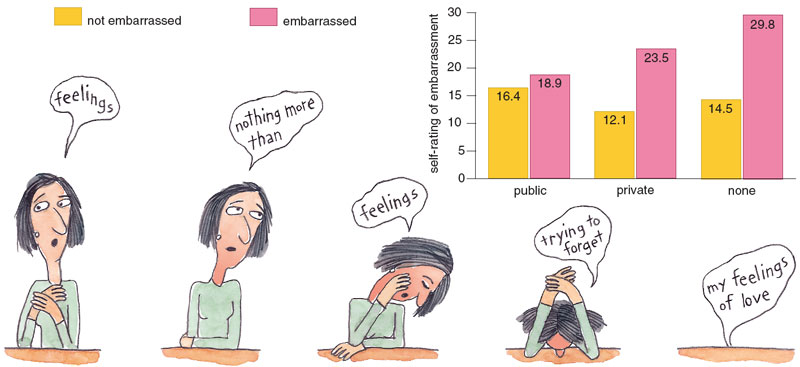
Tom Dunne
Despite our deep emotional unease at showing embarrassment, there is work that suggests that expressions of embarrassment may have a peculiarly cathartic effect. To elicit embarrassment, Mark R. Leary, now at Duke University, and his colleagues brought undergraduates to the laboratory and had them sing a song (see Figure 5). The song used was the old ‘70s hit "Feelings," which strikes most people as painfully saccharine ("Feelings, nothing more than feelings, Trying to forget my feelings of love.…") After singing, subjects were assigned to one of three conditions. Students in one group immediately rated their embarrassment, thus making it clear that the experimenter knew how embarrassed they had felt. People in another group also rated their embarrassment but did so privately, putting their questionnaires in a box. The final group had no opportunity to rate their emotion.
Later in the experiment, subjects' lingering embarrassment was assessed. The embarrassment had dissipated for those who had been able to communicate their embarrassment using the rating system. In fact, they were now no more embarrassed than a control group who had not sang. However, there was no such relief for the group who had not had a chance to express their embarrassment; they continued to feel embarrassed.
It may be that once embarrassment is triggered, it is difficult to stop feeling uncomfortable until one behaves in the functionally appropriate manner (for example, somehow showing acknowledgment or chagrin over one's behavior). Further support for this idea comes from work that finds that people are particularly likely to engage in apologies or acts of remediation after doing something embarrassing, especially when they have inconvenienced others.
A violation of ordinary social protocol may be deliberate or accidental. Thus, imagine a situation where someone makes a crude or potentially offensive comment. His immediate subsequent behavior will ordinarily reveal his intentions. If such a comment is followed by signs of embarrassment, it suggests that the remark was an unintentional violation of social norms and leads observers to make benign attributions towards the person. Without such signals, however, others assume the individual rejects shared social values or has worrisome motives or deficiencies. Thus, it behooves us to have nonverbal signals to differentiate between the two possibilities. In fact, there seem to be a host of such cues available.
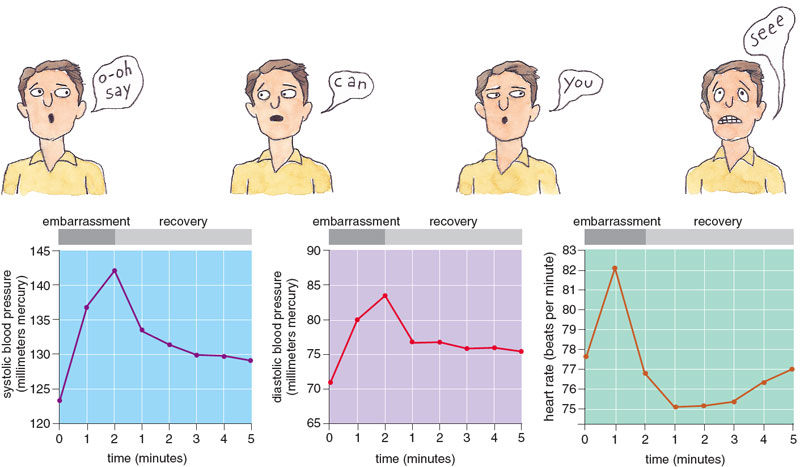
Tom Dunne
Embarrassment has complex nonverbal displays that unfold in a distinctive fashion over time. Dacher Keltner at the University of California, Berkeley, has carried out detailed analyses of the facial displays of embarrassment. The prototypical embarrassment expression includes looking down, smiling and attempts to control or inhibit the smile (for example, by pressing the lips together), as well as frequent shifts of gaze, particularly to the left. Why to the left? The answer is currently unknown, but looking to the left is suggestive of right-hemisphere activation, and other research suggests that the right hemisphere is particularly involved in negative emotions associated with withdrawal behaviors. As shown in Figures 2 and 4, embarrassment displays tend to unfold in a particular sequence over a period of about five seconds. Another common but odd characteristic of embarrassment is that people frequently touch their faces when embarrassed.
Although smiling occurs during embarrassment, it has a different appearance from that of amusement. The smile of amusement or positive affect involves the simultaneous activation of two muscle groups: the zygomatic major, which pulls the corners of the mouth up, and the orbicularis oculi, which crinkles the skin around the eyes (Figure 4). This smile of pleasure has been called the "Duchenne smile" after a French physician who in 1862 created a compendium of facial expressions, some of which were used in Darwin's classic The Expression of Emotions in Man and Animals. On the other hand, in embarrassment, the lips turn up but without the accompanying action of the crinkling of the eyes. Jens Asendorpf of Humboldt-Universität in Berlin has documented another difference related to gaze aversion and timing of the offset of the apex of the smile (that is, when the smile starts decreasing from its broadest point). During embarrassment, people typically look away about one and a half seconds before the smile's apex offset, whereas in humor, gaze aversion usually occurs about a half second after the apex offset.
It is one thing for scientists to document the existence of distinct signs of embarrassment, but how good are people at perceiving them? Keltner and colleagues have shown that subjects are generally fairly good at recognizing embarrassment expressions in videotapes and can distinguish them from other emotional states such as humor and shame. Robert Edelmann's work suggests that people particularly rely on bodily cues to spot another's chagrin.
No description of embarrassment would be complete without considering the blush. For many of us, it is the hallmark display of embarrassment. In fact, embarrassment can occur without blushing, and facial reddening can occur during other physical and emotional states as well. Although the physiology of the blush is still not completely understood, much progress has been made in the past several years.
Don Shearn and his colleagues at Colorado College videotaped subjects singing the "Star Spangled Banner," a song that few can sing well, as most of us have learned from experience. Subjects' physiological reactions were then measured while they and an audience of up to four people watched the videotape. Their results showed that blushing begins with a sharp increase of blood flow, which is then followed by a slower rise in facial temperature. The increase in blood flow is what causes the actual appearance of the blush.
Awareness of blushing, however, seems keyed to the perception of the temperature change. This has an interesting implication: Others are likely to detect our blushing well before we are aware of it ourselves. The decoupling of temperature and blood flow may be due to separate physiological mechanisms. Peter D. Drummond of Murdoch University in Australia showed that facial beta-adrenergic receptors of the sympathetic nervous system play some role in facial blushing. Drugs that block activation of such receptors do not completely inhibit blushing, however, suggesting that more than one vasodilator is involved.
Research in my lab suggests that other physiological aspects of embarrassment also appear to unfold in a unique fashion. My colleagues and I took continuous measures of subjects' blood pressure and heart rates while they watched a two-minute show of themselves singing the "Star Spangled Banner" in the presence of three strangers (see Figure 6). During the first minute, subjects' blood pressure shot up and continued to substantially rise during the second minute of viewing, with an average increase of 16 millimeters for systolic and 10 millimeters for diastolic blood pressure. This is an impressive increase given that no physical activity was involved. During the first minute of watching themselves, people's hearts also began beating faster. However, unlike blood pressure, heart rate dropped back to pre-film levels during the second minute. Generally speaking, heart rate and blood pressure tend to rise and fall together in many emotional states such as anger, fear and happiness. Thus, this decoupling of heart rate and blood pressure may be unique to embarrassment, suggesting that just as there is a distinctive, complex, nonverbal display of embarrassment, there also may be a signature pattern of cardiovascular reactivity.
As Keltner and B. N. Buswell have noted, the embarrassment displays in people share some striking similarities with the appeasement gestures seen in other animals when they want to show submission and avoid aggression from more-dominant animals. Appeasement gestures often involve averting the gaze, baring the neck by moving the head down, shrinking down to appear physically smaller and—in many cases—grooming or self-touching (Figure 7). These responses are often elicited by being stared at, a behavior that arouses embarrassment in humans as well. Many nonhuman primates also show an appeasement grimace that seems somewhat similar to the human smile, and some primates' skin turns red during appeasement.

National Geographic/Getty Images
Mark A. Changizi and his colleagues at Caltech have offered the provocative (and controversial) suggestion that blushing and blanching may be linked to the development of color vision. They argue that the spacing of the three different cone pigments that give us color vision appears particularly well suited for spotting changes in facial coloring caused by differences in blood flow to the facial capillaries. They also note that primates with three pigments rather than two tend to have faces that are sufficiently lacking in fur to allow skin color changes to be detected.
Although no brain area has been identified as the center for embarrassment, the frontal lobes (particularly the orbitofrontal region) appear to play a role in the link between embarrassment and the regulation of appropriate social behavior. Patients who sustain damage to this region may be capable of experiencing embarrassment, yet behaviors that would elicit embarrassment in most of us often seem to cause them no chagrin at all. Perhaps for that reason, they seem to disclose more intimate information than others do and to tease strangers in a way that most people would find overly familiar. In a study by Jennifer S. Beer at the University of California, Davis, and colleagues, patients were asked to come up with a nickname for the female experimenter. They frequently chose names such as "lovely and enticing" and "after dark." These patients also showed impairments in their ability to recognize others' facial expression of self-conscious emotions.
Further evidence for the involvement of the frontal lobes in embarrassment comes from a case study of a patient who experienced seizures caused by a tumor in the medial aspect of the right frontal lobe. The patient reported that his seizures were accompanied by unexplained feelings of extreme embarrassment—remarking that it was as if he had said something very foolish.
Do people everywhere experience embarrassment in the same fashion? This is a difficult question to address empirically. Most cross-cultural research has focused on people's self-reports of their experiences, feelings and expressions, which may or may not correspond to what actually happens in social interactions. Another tricky issue is how to translate terms for emotions into different languages. In English we have separate terms for shame and embarrassment, and research does suggest that the two emotions are different. Embarrassment tends to be over less-grievous errors and almost always happens in the presence of others. Shame seems to be reserved for more-serious social transgressions and can be experienced alone. Smiling, which readily occurs in embarrassment, is unlikely to follow a shameful event.

Photograph by the author.
However, the boundary between events that elicit self-evaluation embarrassment and shame is fuzzy, and some researchers have argued that this form of embarrassment really is a mild form of shame. In many cultures the same word is used to describe both. For example, Jonathan Haidt at the University of Virginia and Keltner have pointed out that in Oriya, the language of the people of Orissa, India, the word "lajya" refers to a variety of emotional states, including embarrassment as well as shame. Many Asian languages also use one word for the two emotions, although some Asian cultures have multiple words that deal with saving face, shame and so on.
Despite these obstacles, there is work that suggests cross-cultural similarities in the types of events that cause embarrassment and in the way embarrassment is expressed. For example, one study found that Iranian and Japanese children agreed rather closely on the situations that give rise to embarrassment, such as being stared at, bodily undress and being criticized. (Of interest, the term used in both of these languages for embarrassment also can mean shame.) In another compelling recent study, subjects in India and the United States were shown various photographs of people displaying different types of emotions. Subjects from both countries generally agreed on the pictures that indicated embarrassment and gave similar accounts of the types of situations that would elicit such expressions. Indians, unlike Americans, however, considered displaying the tongue with it pressed between the teeth as a sign of embarrassment (referred to as a tongue bite, see Figure 8). These authors note that in Southeast Asian countries, this facial action frequently accompanies social mistakes or slips and is often viewed as an appeasement gesture.
Are there gender differences in embarrassment? Here the answer is equivocal. Many studies find no gender differences, but others do find them, and almost inevitably it is women who appear more prone to embarrassment. In Sabini's work mentioned earlier, women reported greater embarrassment over faux pas, but showed no greater susceptibility than men to the other two subtypes of embarrassment. As we will see shortly, women do appear to be plagued more by embarrassment in one important aspect of life, namely, health-care seeking, which may have serious ramifications.
As described above, embarrassment and the negative feelings it inspires often serves positive social functions. But research is increasingly pointing out a darker side to this emotion. People often appear to go to extreme lengths to avoid the possibility of embarrassment, even running risks (or imposing risks on others) that, from any rational perspective, dwarf the true costs of a negative evaluation or an awkward interaction. For example, Sabini argues that the frequent failure of bystanders to intervene during potential emergency situations—a phenomenon that has captivated social psychologists for decades—is most often motivated by a fear of embarrassment. The onlooker worries about looking silly if he or she responds to the situation as a crisis and it turns out not to be. For example, imagine that you are on the beach and someone swimming in the ocean appears to be flailing about somewhat. Is she drowning or just playing? Should you alert the lifeguard or others around you, or swim out yourself? By any rational calculus, the cost of a false alarm should seem minor compared to the cost of failing to take action. However, under such circumstances, people often wait to respond—sometimes too long.
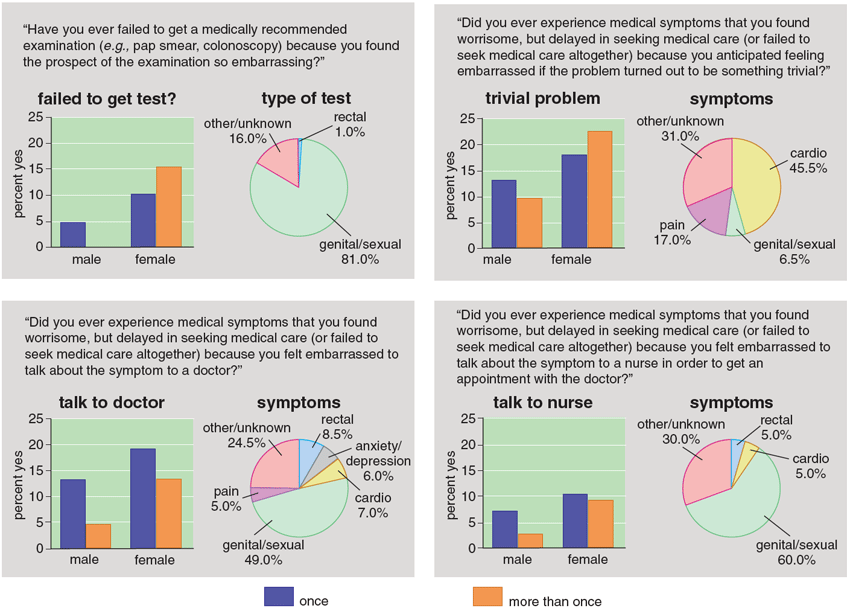
Tom Dunne
Similarly, the desire to avoid embarrassment can be so strong that it leads people to put at risk their own health, as well as that of others. For example, fear of embarrassment has been shown to contribute powerfully to unsafe sexual practices such as failure to obtain and use condoms. Teenagers and young adults are particularly prone to the irrationality of feeling embarrassed over such purchases. In a survey by Darren W. Dahl at the University of British Columbia and colleagues, more than 64 percent of respondents reported feeling moderate or greater embarrassment over purchasing condoms. Furthermore, most admitted using multiple (on average, four) behavioral strategies to try to reduce their embarrassment, such as also buying other items, trying to hide the box and even going to a store outside their neighborhood (a strategy used by more than a fifth of respondents). Within the past few years, it also has become clear that embarrassment dissuades many people from getting medically recommended exams such as pap smears, mammograms and colonoscopies—sometimes with dire consequences.
Recent work in my lab suggests that the deterrent effects of embarrassment on seeking health care may extend beyond just avoiding awkward medical exams. My colleagues and I have been trying to get a better grasp of when and how embarrassment affects health-care decisions across a variety of different situations. We had a demographically diverse sample of 384 adults (mostly from the United States) answer questions about a number of different forms of medical embarrassment. In particular, we asked our subjects to provide anonymous detailed descriptions of the symptoms and issues involved in four types of medical-related situations that have the potential to give rise to embarrassment (see Figure 9).
Our results revealed several interesting things. First, more than half (57 percent) reported being deterred from seeking medical care by fear of embarrassment for complaints they believed to be serious, including 20 percent who failed to schedule needed medical examinations. It seems likely that the numbers we obtained are underestimates of the real incidence of such deterrence, since subjects may have forgotten many incidents and are likely disposed to minimize their own irrational behaviors.
Fully one third of the sample reported that at some time, despite being worried about a potentially serious symptom, they had failed or delayed seeking medical care in order to avoid looking silly or feeling embarrassed if the symptom turned out to have a trivial cause. For a fifth of the sample, avoiding such potential embarrassment had led them not to seek treatment on more than one occasion. The most common symptoms involved in such situations were those that might indicate cardiac distress (that is, chest pain). From these data, it appears likely that delaying or not seeking medical attention because of embarrassment threat may be a substantial cause of avoidable mortality and morbidity. This is especially true in the present era of thrombolytic agents and emergency angioplasty, which can greatly reduce the damage caused by heart attack, but which require rapid treatment to be effective.
A third finding was that fear of embarrassment prevented significantly more women than men from seeking medical attention. Is this because the typical woman faces more opportunities for embarrassing exams (for example, annual pap smears)? Actually, the sex difference was not confined to avoiding exams. For example, more women than men avoided talking to a doctor or nurse about an embarrassing symptom and failed to have a symptom checked out for fear of embarrassment should it turn out to have a trivial cause. People with lower incomes also reported that fear of embarrassment was a greater deterrent to seeking medical care than it was for those with higher incomes.
The fact that people would let fear of embarrassment lead them to run what they themselves judged to be severe and preventable risks of injury and death is rather striking. Equally striking, though, is the fact that people seem prone to doubt that others would be so influenced. Sabini and colleagues found that people seem to underestimate the tendency of others to experience embarrassment. Other investigators have reported that people tend to underestimate how much they will allow the threat of embarrassment to govern their own future choices. All of these cognitive biases may lead people to view their own behavior as more rational than it is.
The overlooked irrationality, however, is not the internal struggles postulated by Sigmund Freud and others of his perspective. Rather, human beings seem to have an exquisite susceptibility to being manipulated by social situations. We tend to make choices that maintain a veneer of smooth social interaction even while running risks and incurring costs that may be far greater in scope. Embarrassment likely evolved to regulate social behaviors in a way that aids the welfare of the person embarrassed. It often probably does just that, but our intense desire to avoid it may often lead us to engage in irrational behaviors that benefits neither ourselves nor those around us.
Click "American Scientist" to access home page
American Scientist Comments and Discussion
To discuss our articles or comment on them, please share them and tag American Scientist on social media platforms. Here are links to our profiles on Twitter, Facebook, and LinkedIn.
If we re-share your post, we will moderate comments/discussion following our comments policy.